As a dad of two, I really care about what pours from our taps. When it comes to water filters, I only want the best for my family.
We’ve had quite a few issues with our well water, and like many people on well water, sediment has been one of them.
So, I teamed up with our in-house water filtration expert, James Layton, and thoroughly assessed the numerous top-rated sediment filters for well water available on the market.
Combining our cumulative 25 years of experience, we studied user manuals, engaged with customers, got insights from industry gurus, and teamed up with manufacturers.
Our hands-on testing provided a comprehensive evaluation of over 30 products.
From this research, I finally narrowed down the selection to just nine filters, with four that really stand out.
Spoiler Alert: Here’s Our #1 Pick
The SpringWell Whole House Sediment Filter is our top pick for the best whole house sediment filter for well water.
It effectively traps sediment particles down to 5 microns, removing dirt, silt, clay, and debris.
Plus, it offers high efficiency and easy maintenance, and it’s supported by an industry-leading warranty.
Best Sediment Filters for Well Water: Our Top Picks
Best overall: SpringWell PF-10
Best eco-friendly sediment filter: RKIN CBS
Best budget option: Culligan R50-BBSA
Best spin-down filter: iSpring WSP100ARB
Factors We Consider: Expert Reviews From Real World Experts
We use Drinking Water’s detailed seven-step research methodology to thoroughly study and review products available on the market.
This procedure enables us to gather both qualitative and quantitative data for evaluating a product and gauging its quality.
We tested each filter, looked closely at water test reports, talked with manufacturers and experts, and got firsthand info from users.
If you’re new to sediment water filters, I highly suggest you read our before-you-buy guide to sediment filters and then scroll back to our recommendations.
It will make what you’re about to read much more useful. If you’re already familiar with these filters, here are my top picks.
Best Overall Well Water Sediment Filter
SpringWell Whole House Sediment Water Filter
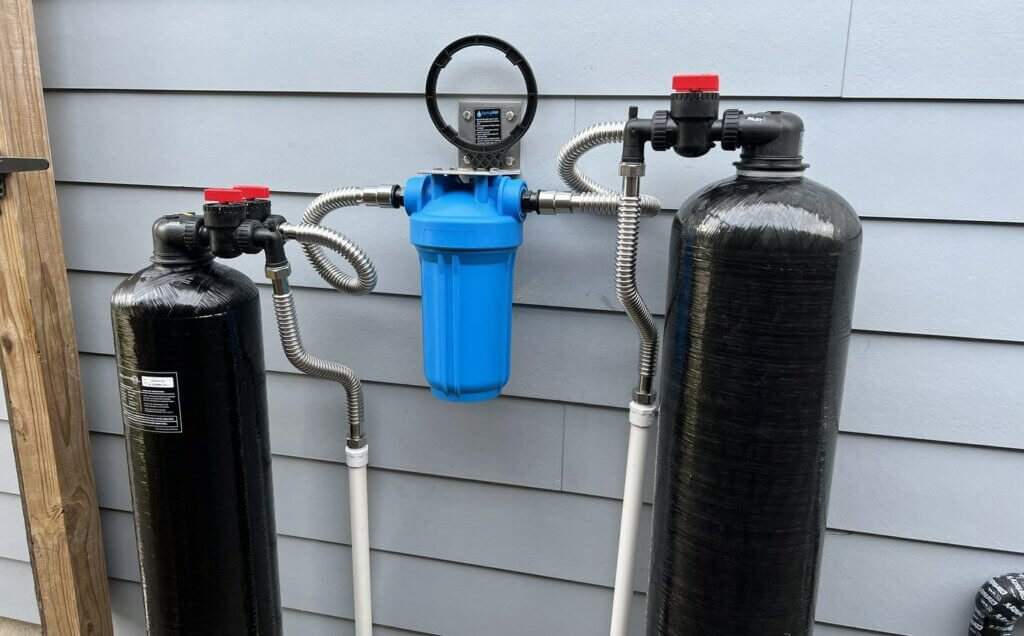
The SpringWell whole-house sediment filter is our top pick due to its high cleaning efficiency, easy maintenance, affordability, and extensive warranty.
Who it’s for
The SpringWell sediment filter is ideal for those suffering from high sediment concentrations in their private well water or city water.
It is specifically designed to get rid of fine dirt and silt particles.
It’s also a great fit if you need a whole-house sediment removal filter that functions effectively as a pre-filter for other water treatment systems.
This filter is for you if you’re seeking an affordable option with high efficiency and a decent lifespan.
If you prefer a do-it-yourself installation to save money, this filter is unlikely to give you trouble.
Available in two sizes, one with a max flow rate of 20 gpm and the other 35+ gpm, it’s an effective solution for homes of all sizes.
Why it’s the best
SpringWell’s whole-house sediment filter can trap really fine particulates down to 5 microns.
One of the great things about this filter is it pairs up perfectly with SpringWell’s water treatment systems, including the UV sterilizer, water softener, and reverse-osmosis filter.
The benefit here is you can create a complete whole-house filtration system by integrating this sediment filter as a pre-filter for both well water and city water supplies.
What makes it our top choice is its affordability.
When you’re investing in more expensive water treatment systems for your well water, you don’t want to dent your wallet with a high-priced sediment filter.
This sediment filter not only safeguards your whole-house water system but also saves money, effort, and time that would otherwise go to costly replacements and maintenance.
I’ve tested dozens of products on the market and the build quality of this canister surpasses that of most others.
Speaking with the manufacturers, I discovered that SpringWell doesn’t cut corners when it comes to sourcing high-quality components for its filters.
In the water treatment market, finding a lifetime warranty and a six-month money-back guarantee on sediment filters, especially among the more affordable options, is quite challenging.
SpringWell stands out with its industry-leading warranty.
Some things to keep in mind
The type of sediment filter and micron-rating you should opt for depends on the concentration and size of the sediment particles in your water.
SpringWell’s 5-micron sediment filter is great for fine particles. However, if you have larger-sized sediment as well, it will still catch it.
Unfortunately, if it’s trapping large chunks of sediment, it may clog up much earlier than its intended six-month lifespan, requiring more frequent replacement.
If large particles are an issue in your water, you might want to pair this with a larger-micron sediment filter for the best results.
SpringWell does sell a 152-micron spin-down filter that you can install with this system to tackle large debris.
While the warranty is amazing, I should mention that if you fail to follow the installation instructions correctly, you could void your warranty.
Final thoughts
Overall, the SpringWell whole-house sediment filter is an excellent choice for both well water and city water, offering high efficiency at an affordable price.
Capable of capturing dirt particles as small as 5 microns, it ensures clean and clear water throughout your home.
Additionally, it safeguards your water treatment systems from clogs and damage.
If this sediment filter is the one you’re looking for, get it here.
Best Eco-Friendly/Low-Maintenance Sediment Filter
RKIN Whole-House Sediment Filter

The RKIN CBS 5 Micron Whole House Sediment Filter is an excellent choice if you’re looking for a low-maintenance solution. The filters on this product last as long as a year, but the up-front cost is high.
Who it’s for
The RKIN sediment filter is for you if you’re seeking an eco-friendly filter that lasts long and requires low maintenance.
It’s a good option for those who prefer not to replace filters every four to six months and don’t fancy reduced water pressure.
Since the filter is big in size, it offers a good lifespan of up to 12 months (depending on your water quality) and is suitable for large households with more than three bathrooms.
Like the SpringWell whole-house sediment filter, this one is also only suitable for filtering out fine dirt and silt particles down to 5 microns.
For removing large chunks of debris, you will need to pair this with a 60-micron or higher rated spin-down filter.
Why it’s the best
The RKIN sediment filter uses a polypropylene cartridge, which can effectively trap all your dirt, silt, and clay particles down to 5 microns, meaning it will remove pretty much all the sediment in your water before it gets to your tap.
What really makes this filter stand out, though, is its big size and long lifespan.
Its long life not only saves you money that, with other filters, may go into frequent replacements but also makes this an eco-friendly option since it will produce fewer wasted cartridges.
It’s sturdy and powerful, serving well as a stand-alone filter to safeguard your plumbing and appliances from clogging.
It’s also versatile enough to work as a pre-filter for your water treatment systems.
Some things to keep in mind
The RKIN sediment filter is a 5-micron filter designed to capture fine particles.
To effectively capture a mixture of fine and larger sediment, it’s recommended you pair this filter with a spin-down filter, which makes my next point even more important.
This sediment filter costs more than double the price of the SpringWell 5-micron sediment filter.
However, it offers twice the filter life in return. If you’re fine with shelling out over $300 up front, it could be worth it.
But for those trying to avoid spending big on a sediment filter, the RKIN might not be the best choice.
You might think if you spend more up front on a filter that requires less maintenance, the overall cost of ownership will be lower.
This is true, but it’s not quite as drastic as it seems.
The 10-year cost for the SpringWell 20″ filter system totals $793.13 (assuming a six-month lifespan per cartridge), while the RKIN 20″ system amounts to $694.47.
These filters last one year but cost more.
Of course, this calculation presumes consistent use of the same canister for 10 years, only replacing the filters, and they are also based on pricing as of the time of writing.
Yes, it does cost $100 less, but that’s only about $10 a year.
However, the RKIN filter does need to be replaced less often, which is convenient and slightly easier on the environment.
Another thing to keep in mind is that it’s big — just one size: 4.5″ x 20″ — made for big homes or commercial applications with lots of water use and serious sediment.
If you’re in a small house with one to two bathrooms and mild sediment levels, this filter might be overkill.
Why spend over $300 on a sediment filter when you can get the job done for under $100 with a smaller filter?
RKIN claims to use patented bacteriostatic technology in its system, but it seems more like a marketing gimmick because they don’t adequately explain how this technology benefits the user, aside from a vague statement about enhancing the purity of the water supply.
Final thoughts
The RKIN whole-house sediment filter is an excellent choice if you want an eco-friendly filter that lasts a long time and requires low maintenance.
It effectively cleans dirt and silt particles down to 5 microns, ensuring clean and fresh water from every tap in the house.
If it aligns with your water filtration needs, get one for yourself here.
Best Budget Sediment Filter
Culligan Whole House Pleated Sediment Filter
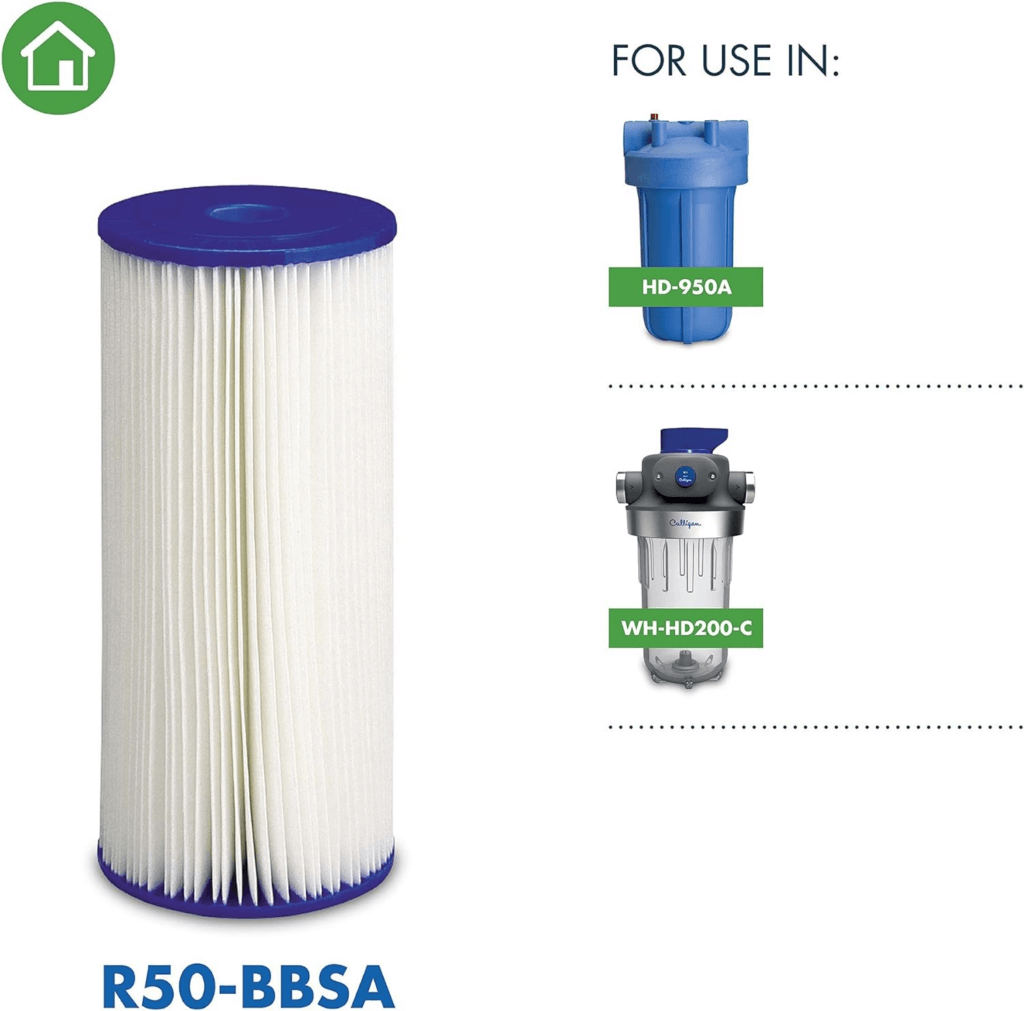
The Culligan pleated cartridge filter (R50-BBSA) in a clear housing (WH-HD200-C) is the best budget option to remove sediment particles above 50 microns in your well water.
Note that its warranty is limited in comparison to SpringWell and RKIN.
Who it’s for
The Culligan whole-house sediment filter is an ideal choice for private well owners with coarse sediment like debris, rust, and scale fragments in their water larger than 50 microns.
It’s best for those who don’t have a big budget and want a filter with significantly lower up-front and maintenance costs.
Homeowners worried about water pressure will like the pleated structure, which is designed to prevent interruption or reduction of water flow.
Pleated filters don’t change the main function of a sediment filter; they only enhance it.
The Culligan filter will still shield your water treatment and plumbing systems from clogging due to large particles.
Why it’s the best
Culligan’s affordable housing and filter replacements help reduce the total cost of ownership.
Among cartridge-based sediment filters for large sediment particles, Culligan’s 50-micron option works really well and gives great quality for a good price.
Not only is it less expensive up front, but the total cost of ownership over 10 years is just over $420, which is several hundred dollars less than some of the other options I’ve reviewed.
The filter’s pleated structure ensures high cleaning efficiency and offers big dirt-holding capacity due to its large surface area, making it quite useful if you have high concentration of sediment in your water.
Your well water can carry sediment particles of various sizes.
Placing this 50-micron sediment filter before your 5-micron or 10-micron filter can effectively remove both large and tiny sediments.
This creates a robust line of defense for your water treatment systems and plumbing.
I like Culligan’s transparent, see-through housing. You can easily peek inside and check how the filter’s holding up, unlike opaque ones.
This is super handy, especially if you’ve got lots of gunk in your water that wears out the filter faster than six months.
Plus, this Culligan gizmo comes with a battery-powered countdown for the filter’s life. No need to fuss with setting timers on your phone.
It’s important to note that while it tracks time and alerts you when the expected life of the filter ends, it doesn’t measure the filter condition.
To add to the convenience, you can subscribe to have replacement filters sent straight to your door on a regular schedule.
Some things to keep in mind
Some pleated sediment filters are washable and can be reused a few times before disposal.
Culligan only uses the term “washable” in its product title, but I couldn’t find additional evidence, such as the quality of the pleated filter material, confirming its reusability, or washing instructions.
And washable or not, it’s advisable to replace the filter once it reaches its expiration time.
The filter housing is backed by only a two-year warranty, which is quite underwhelming compared to the lifetime warranties offered by SpringWell and RKIN.
Culligan explicitly states that the warranty may be void if the unit is not installed by a plumber approved by Culligan. Unfortunately, you cannot DIY its installation.
Finally, this filter is rated for particles 50 microns or larger.
It’s not suitable for smaller particles, so you’ll need to combine it with another sediment filter if you have fine sediment in your well water.
Final thoughts
If your well water has big debris that’s 50 microns or larger, Culligan’s pleated sediment filter (R50-BBSA) in a clear housing (WH-HD200-C) is an excellent and affordable choice.
While the two-year warranty might not be ideal, the pleated structure enables deep cleaning within a reasonable budget.
Best Spin-Down Sediment Filter for Large Sediment
iSpring Spin-Down Filter
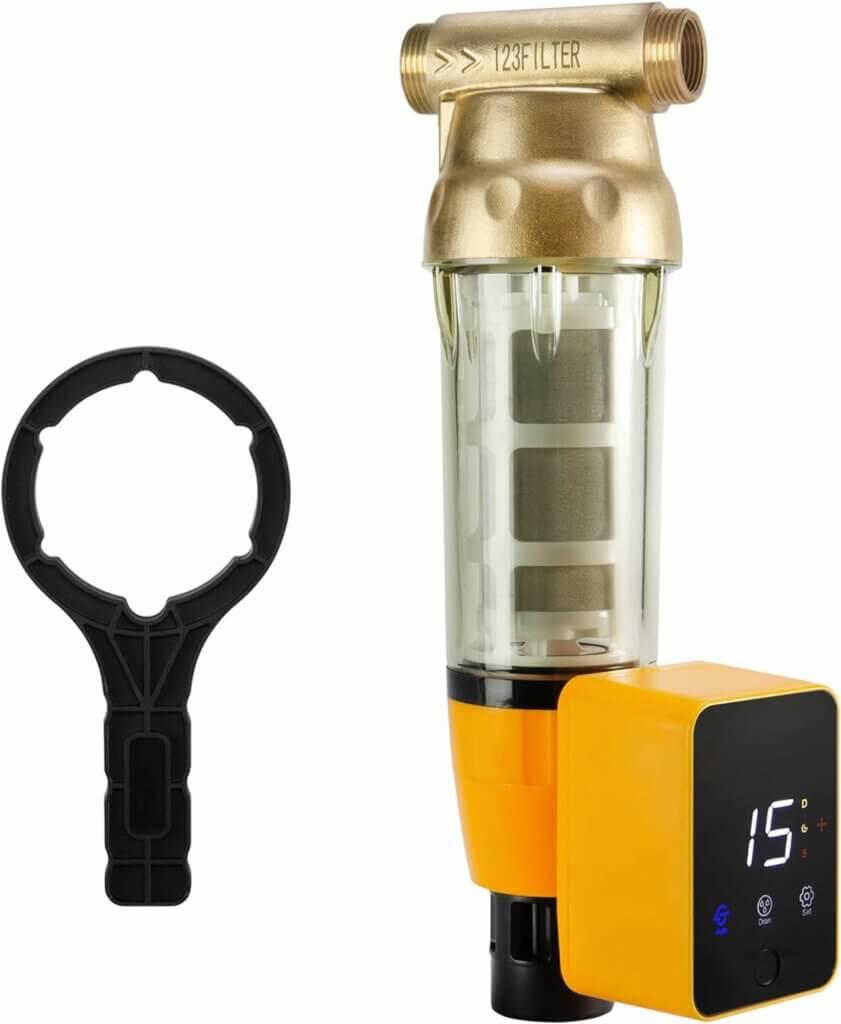
The iSpring sediment filter is my favorite pick among spin-down sediment filters.
It effectively eliminates large debris of 100 microns and includes an auto-flushing module, making maintenance incredibly simple.
Similar to other spin-down filters, this filter doesn’t need replacement and can last for years.
Who it’s for
The iSpring spin-down sediment filter is designed for private well owners dealing with large debris in their water.
Specifically targeting sediment sizes of 100 microns or larger, it also offers a 50-micron variation to suit different water qualities.
If you’re not fond of manually flushing spin-down filters, the iSpring spin-down filter is the solution because it allows you to set it up for automatic flushing.
This filter is an excellent choice if you aim to create a comprehensive filtration system, safeguarding your additional water filters and plumbing fixtures from clogging.
If you’re seeking an eco-friendly option, this filter is for you.
It lasts ages, so it not only cuts down on the cartridges you throw away but also lowers your carbon footprint by reducing the need for new cartridge deliveries.
Why it’s the best
The most prominent feature that makes it stand out is its Auto Flushing Module, which automatically flushes the filter and pushes out the accumulated debris out of the housing.
The digital touch screen allows you to control the flushing of the filter. You can set it to manual, semi-auto, or auto, depending on your needs.
Flushing removes the accumulated debris at the bottom of the housing according to your preset schedule.
The iSpring sediment filter is also reusable. Once the stainless-steel mesh screen clogs with debris, you can take it out and wash it with a brush or by soaking it in vinegar.
You can reuse the stainless-steel mesh screen a few times before it requires complete replacement.
The clear housing of this model allows you to see the filter condition easily.
Another reason this filter is among the best is its eco-friendliness.
You may not realize, but water treatment products can be terrible for the environment, using nonrenewable energy to manufacture and ship them and filling landfills once they’re expired.
The more often you replace them, the less eco-friendly they are.
You won’t need to replace and discard used cartridges into a landfill every three to four months because this spin-down filter typically lasts up to two years.
Some things to keep in mind
Spin-down filters are specifically installed to do the heavy lifting so the rest of the fine sediment filters can perform well.
If you have tiny sediment in your water, make sure you pair this filter with a sediment filter with a smaller micron rating to tackle all the tiny gunk.
iSpring recommends keeping this filter away from heat sources and avoiding outdoor installation in freezing cold areas because the water inside could freeze, expand, and burst the housing.
Remember, it comes with a limited one-year warranty, and extending it will cost extra.
Both the filter housing and cartridges are a bit expensive.
I was expecting a longer warranty than just one year.
Final thoughts
If you have large sediment in your water and want the convenience of automatic flushing, the iSpring spin-down sediment filter is for you.
Although the warranty is not great on this one, it is still an effective spin-down filter that you can pair with other sediment filters and water treatment systems to produce clean water.
Honorable Mentions
SimPure Spin-Down Sediment Filter
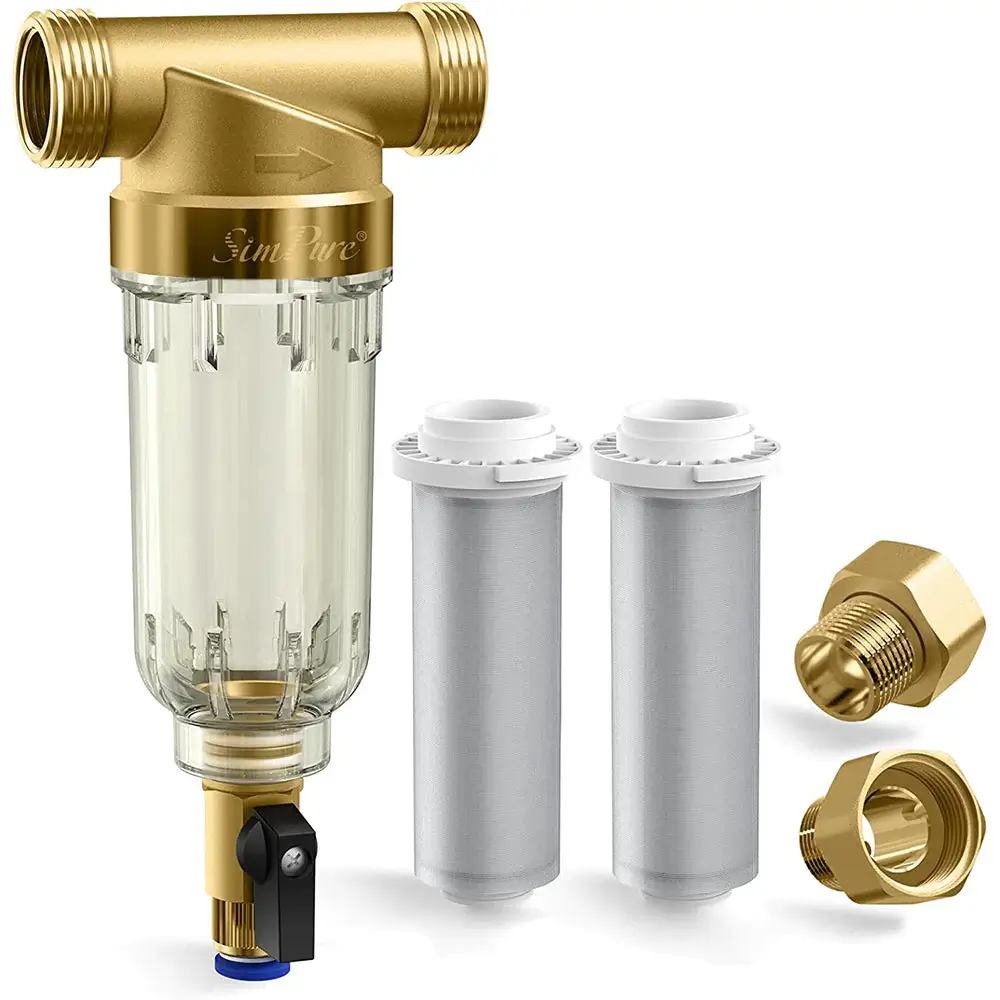
If you have large sediment particles and seek a stand-alone spin-down filter with more affordable pricing, the SimPure spin-down filter is for you.
Similar to iSpring’s spin-down filter, it effectively traps sediment such as rust, rocks, and dirt larger than 40 microns but costs half as much.
Additionally, it comes with an additional 200-micron steel mesh to trap very large sediments like grit and flakes.
I appreciate the overall quality of this filter. It’s made from freeze- and impact-resistant, BPA-free material that felt sturdy as I unpacked it.
You can easily install it yourself using the video tutorials available on SimPure’s website.
The only major difference between the functionality of the iSpring and the SimPure is that the SimPure lacks the automatic flushing system.
You will need to manually flush the SimPure by turning the knob at the bottom every 15–30 days.
However, you can still clean the stainless-steel meshes after a few months of continuous use and reuse them for up to two years.
Another downside is that SimPure offers only a one-year warranty, which is a bit disappointing, especially when brands like SpringWell offer a lifetime warranty at an even lower price.
Overall, it’s a decent alternative if you want to effectively remove large particles from well water at an affordable price while keeping maintenance to a minimum.
This sediment filter serves as a strong line of defense for all subsequent water treatment systems, as well as your pipes and water-based appliances.
Home Master Whole House Water Filter
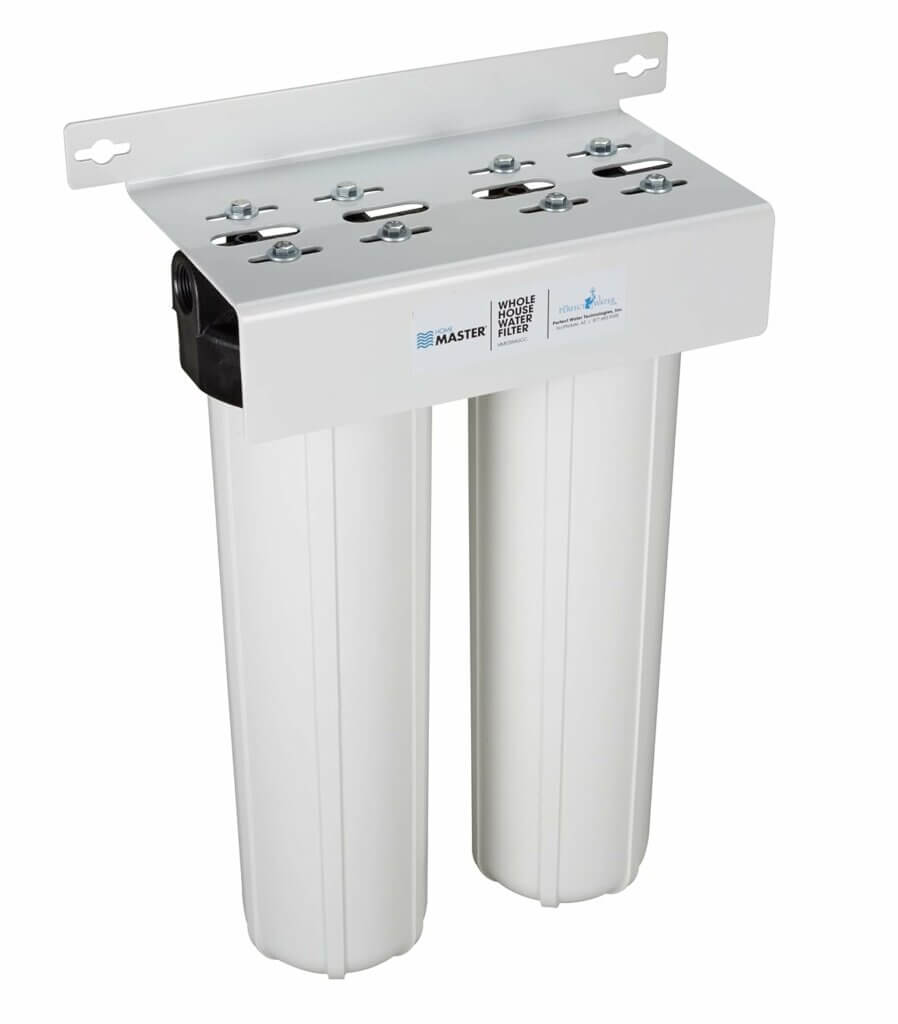
If you’re looking to remove more than just sediment from your well water but also lead, copper, VOCs, pesticides, and herbicides, the Home Master two-stage whole-house system may solve your problem.
What I like about this system is it’s a “depth sediment filter,” or multistage sediment filter, which makes it excellent for removing a wide range of sediment sizes in well water.
This eliminates the need to install multiple sediment filters with varying micron ratings.
The whole-house system features a four-gradient density sediment filter as its first stage.
It has 25-micron pores at the outer edge, 10- and 5-micron layers in the middle, and 1-micron pores toward the core.
The next stage consists of KDF filter media and catalytic carbon, effectively removing contaminants like chlorine, pesticides, herbicides, and some heavy metals such as lead, copper, and aluminum.
In terms of cleaning performance, this filter does a great job.
But it’s only suitable if you’re dealing with contaminants that a KDF 85 and catalytic carbon filter can effectively remove.
Well water may contain other contaminants, such as hard minerals and nitrates, which cannot be removed by these filters.
At this high price, it’s better to test your water before choosing the Home Master Whole House Filter.
The Bottom Line: Best Sediment Filter for Well Water
After thorough research and analysis, we can confidently say that the SpringWell 5 Micron Sediment Filter reigns supreme as the best choice for sediment filter for well water.
This champion captures extremely fine sediment as small as 5 microns and holds up for a solid six months.
Kudos to SpringWell for offering two sizes of this filter, allowing you to pick the one that suits your water demand.
With its affordability and lifetime warranty, it’s our top pick among well water sediment filters.
Seeking an eco-friendly filter that lasts long? Check out the RKIN sediment filter.
Dealing with big sediment chunks? The iSpring reusable spin-down filter might be your hero.
Research Methodology: How We Test and Review Products
To compile this list of the top sediment filters, I collaborated with my team at Drinking Water and employed a comprehensive seven-step methodology.
This refined process allows us to delve deeply into each product’s intricacies and rank them based on various critical factors.
While you can explore the detailed methodology here, this section provides a brief overview of the steps we follow:
Use analysis
As our initial step, we meticulously identify the most suitable use case for each product featured on our list.
This step is crucial because manufacturers occasionally omit information about what their filters cannot remove or the scenarios in which their products might not perform optimally.
Our team of experts jumps in, testing and checking these products to see if they really do what they’re supposed to do.
We want to make sure they walk the walk and not just talk the talk.
Learn more about how we do our use analysis.
Tech check
Moving on to our next step, we dive into the nitty-gritty of filtration technologies.
It’s crucial for us to verify if each brand’s applied technology is up to the task of handling various water quality issues effectively.
We make sure to uncover any sneaky moves where brands might try to trick users with flashy but dubious “new and fancy” technologies.
Our goal is to ensure that the technology a brand boasts is genuinely capable of delivering on its promises without any hidden gimmicks.
Learn more about how we conduct our tech check.
Water test data
In the following step, we roll up our sleeves and fact-check the claims made by the manufacturer.
To do this, we compare the water test reports furnished by the company with our own extensive test results and the insights gleaned from our team of experts.
This hands-on approach allows us to validate whether the promises made by the manufacturer align with the real-world performance of its products.
Learn more about how we collect and use water test data.
Installation test
Next, we evaluate the installation process, scrutinizing whether the company offers adequate installation tools and clear guidelines for a seamless setup.
This allows us to ascertain the ease of installation and helps us recommend products that not only perform well but are also hassle-free to set up.
Explore how we run our installation tests.
Cost-of-ownership analysis
When presenting products, we highlight which ones offer the most cost-effective solutions and transparently outline when you might incur these expenses.
We calculate up-front costs, installation costs, replacement costs, electricity usage, and more to provide you with the best solutions.
You can read about it in detail here.
Warranty check
In addition to evaluating product performance, we thoroughly examine each item’s warranty and refund policy.
We understand the significance of investing in long-lasting products backed by solid warranties, ensuring you get the most value for your money.
We aim to guide you toward options that not only excel in performance but also offer extended durability and reliable protection through decent warranties.
Learn more about how we check warranties.
Customer service test
Lastly, we thoroughly evaluate the brands’ customer service.
We believe in companies that prioritize their customers’ needs, offering responsive, helpful, and reliable support.
A brand’s commitment to excellent customer service reflects its dedication to ensuring customer satisfaction and support beyond product sales.
Learn more about our customer service test.
Before You Buy a Sediment Filter for Well Water
To paraphrase Voltaire, with a private well comes great responsibility.
According to Johnny Pujol, our trusted partner and a water quality engineer, “With well water there is no regulatory oversight, so it’s up to each well user to ensure the water they are drinking is safe for their health. This means testing at least once a year because well water changes over time.”
Well water sourced from underground aquifers is highly susceptible to contamination from various impurities including dirt, silt, and debris.
In most cases, installing a sediment filter becomes an absolute necessity.
Sediment filters remove particles like dirt, sand, silt, debris, and clay from the water.
Additionally, they effectively reduce turbidity and cloudiness caused by suspended solids.
Beyond the obvious benefit of clean and clear water, sediment filters play a vital role in safeguarding plumbing systems and water-based appliances, like dishwashers, coffee makers, and water heaters, from potential clogs and damage.
Sediment filters are crucial for your water treatment systems.
Sediment filters also protect and improve the life of water treatment systems you may have installed.
For instance, for microbial contamination in well water, you may need a UV sterilizer.
Even though ultraviolet light is effective at eliminating bacteria in well water, sediment can pose a problem for UV systems.
Turbidity and cloudiness create shadows where bacteria can hide during the UV treatment process.
When the UV light is blocked by the suspended sediment, it can’t reach and destroy these microorganisms in the water.
Sediment filters serve as a crucial defense for reverse osmosis (RO) filters. Dirt particles, if not filtered out, can damage the delicate membranes within the RO filter.
Similarly, sediment can clog the components within an ion exchange water softener, causing unnecessary damages and extra maintenance bills.
Sediment filters can’t remove everything.
Here’s the deal: While these filters are awesome at tackling gunk, they’re not magic.
They won’t touch other stuff like iron, heavy metals, or microbes. For those, you need specialized filters or treatments.
So, having a good sediment filter is a solid start, but keeping an eye on what else might be lurking in your well water is pretty important too.
Which is why I strongly advise you to test your well water before choosing a water treatment system.
Pay attention to the micron rating.
Each sediment filter is assigned a specific micron rating, indicating the size of particulates it can effectively remove.
The lower the micron rating, the smaller the particles it can eliminate. For instance, a 5-micron-rated sediment filter can capture particles as small as 1/15th the size of a human hair.
In contrast, a 100-micron filter has openings comparable to ground coffee particles.
What you need largely depends on the size and concentration of sediment, your overall water quality, and the specific water treatment systems you have in place.
Try to avoid making the common mistake of installing a fine sediment filter for coarse and rough water.
Your sediment filter will clog more often than it’s meant to in such cases. Similarly, installing a large micron filter for fine particles will yield no result.
When dealing with varying sizes of sediment in water, using multiple sediment filters with different micron ratings can produce better results.
If you’re feeling unsure about the best type for your needs, reaching out to an expert could help clear things up.
Research types of sediment filters.
As I mentioned, every water situation needs its own special treatment.
You’ll come across different sediment filters in the market, each meant to tackle specific issues.
- Pleated sediment filters: These filter cartridges are shaped like an accordion and have a high surface area due to the pleated structure. Pleated cartridge filters offer higher dirt-holding capacity and uninterrupted water flow.
- Depth sediment filters: Depth filters are ideal for handling sediment and dirt particles of different sizes. Their thick layers are characterized by larger holes at the surface that gradually transition to tighter holes toward the core. Depth sediment filters have a long lifespan and high dirt-holding capacity.
- Spin-down sediment filters: Spin-down sediment filters are designed for trapping large particles rather than fine ones. The “spinning” pushes particles to the outside, after which it settles on the bottom. The accumulated particles need to be flushed periodically, but there are no cartridges to change.
When it comes to nailing down the perfect sediment filter, it usually takes a bit of trial and error.
A good starting point for many is to go with filters around 5 or 10 microns and then tweak things as needed.
It’s all about adjusting to the specific sediment in your water for the best filtering results.
Back to product recommendations
Dive Deeper: In-Depth Water Filter Guides
If you’re new to water filtration or seeking more insights before committing to a purchase, here are some resources to guide you:
- Everything you need to know about well water
- Treating well water supply
- Best whole-house filters for well water
- Best iron filters for well water
- Best sulfur filters for well water
- Best whole-house filter and softeners combos
- Best under-sink water filters for well water
- The Best Water Filter Pitchers For Well Water
- The Best Big Blue Filters for Well Water
- The Best Micron Filter For Well Water
- Best Faucet Water Filter for Well Water
Frequently Asked Questions
What is the best water filter for sediment?
The SpringWell Whole House 5 Micron Filter is the best sediment filter for well water.
It effectively removes dirt, silt, and particles down to 5 microns.
At an affordable price, you’ll get excellent performance, a long filter life, and a lifetime warranty.
What micron rating do I need for well water?
The micron rating of your sediment filter depends on your well water quality and the type of water treatment systems you may already have installed.
Generally, a rating of 5–10 microns is suggested as pre-filters for UV filters.
To eliminate larger debris and chunks in well water, you might require 20–50 microns.
In some scenarios, a combination of sediment filters may be necessary to capture particles of various sizes.
Is a sediment filter necessary on well water?
Yes, a sediment filter is necessary if your well water contains dirt, silt, clay, and debris.
A sediment filter will protect your plumbing, water-using appliances, and water filtration systems.
If you don’t have sediment, you don’t need a sediment filter.
It’s best practice to test your well water and install a water filter based on your test results.
Where do you put a sediment filter in well water?
A sediment filter in a well water system is typically placed along the main water supply line after the water has passed through the well pump and before it enters other water filtration systems.
This placement traps particles and debris, protecting your plumbing and water treatment systems, like water softeners and UV filters, from potential damage.


